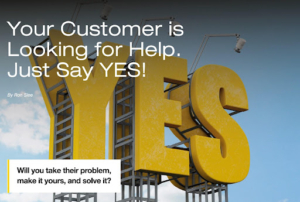Just Say YES: It Confuses People
Just Say YES: It Confuses People
This week, our founder Ron Slee walks us through how to answer customer questions with, “Just Say YES: It Confuses People.”
Just Say YES: It Confuses People.
Nike started it, didn’t they? Just Do lt. How could you forget it? It was and continues to be everywhere.
I was reminded of that yesterday during a Zoom meeting with Steve Clegg at Winsby. We were discussing finance and forecasting when the discussion turned to questions that are asked of dealers. Steve opined that there are too many answers to questions that are posed by customers to dealers. Many are met with a response of additional questions — seeking more information or clarity. Steve suggested that there was a better approach to the questions that are asked of dealers. The questioner is just asking for help. So why not respond with a simple “Yes, I can do that for you. I can help. I will get it for you. ” Take the problem or the concern away from the customer.
A few weeks ago, in another discussion with Mets Kramer and Stephanie Smith, the same point came up from a different direction. When the customers come to your website, what are they doing? At Learning Without Scars, we changed our website to ask a question on the landing page — right in the middle of the page, and it zooms toward you and away from you so you can hardly miss it. We ask, “Need Help Finding Something? Click Here.” And you are taken to a series of choices available to the visitor from the website.
It is making a difference for our website visitors. I had not taken into consideration that there is a such a large volume of information on our site. I know where everything is, so why shouldn’t everyone else? That is what in the teaching profession we call the curse of knowledge.
Our customers are looking for solutions not answers.
Recently I wrote an article about us living in a “The golden age of information.” We can get answers to anything. Just ask “Google” or “Alexa” or “Siri.” Our access to information is amazing to consider. Information used to be a barrier to entry to our industry – dealers in the capital equipment world. That is no longer true. One of the problems is that too many of us are still thinking that our sales force is available to give information to customers; that our sale force is a group of people that function as if they were a “walking brochure.” Our customers do their own research at their convenience, and when they are ready to do something they call us. Alex Kraft has understood this and created a wonderful tool for customers and dealers and the sales force. He has created an internet-based tool that uses text messages to announce that a customer has a need and is looking for a machine. That information is texted to clients of his company, Heave. He answered the question with “Yes.” Going further, he is asking the sales force who receive the texts, “Do you want to help?”
Taking Yes to Yet Another Level
Dale Hanna and Foresight Intelligence eliminate the need for questions with their SMS program, which sends text messages to customers that are having work done on their equipment. Rather than playing phone tag to find out the status of a repair between the customer and the dealer service department, which typically requires a few calls to connect, Foresight has a system that sends a text to each customer, at their choice, regarding any action concerning their machine. It could be an inspection, it could be a quotation, it could be pictures – it is slick, if you ask me. There is no longer the need to ask questions to get a status update. You get that update at the “speed of text.” That doesn’t eliminate the customer’s ability to talk to the dealership, but it changes what the conversation is about.
A Simplistic Approach to What Concerns Your Customers
Simon Sinek has become famous with his question “Why?”
This is part of one of the most viewed TED talks, “Start with Why.” He poses three questions in his Golden Circle: What do you do? How do you do it? Why do you do it?
It has become commonplace now for people to explore the answers to these three questions. The magic is that the why is not for the money. It is for some deeper meaning. It goes to the heart of who you are and what you believe. If you haven’t already watched the TED talk, I strongly urge you to take the time and do it.
That talk touches the same point as the “Just Say Yes” message here. The customer is looking for help. For something. Whatever it is, just say Yes. I used to respond to customers when they called me and said they had a problem “No, Sir, you don’t have a problem, I do.” It caused a few pauses I know, but the customer got it. I was taking on their problem — I was going to find an answer. I was going to solve it for them. I say Yes. What do you do?
The Time is Now.


